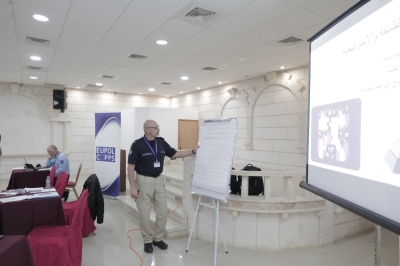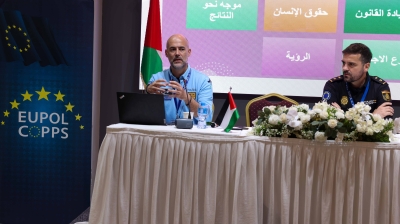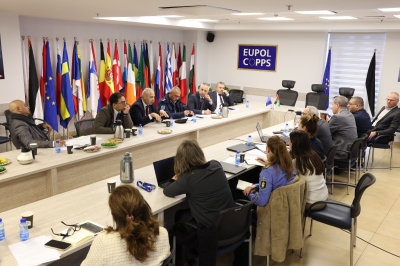“For a police service to be built on democratic principles, it needs to be predictable and reliable”

It turns out that Menno van Bruggen, a police superintendent from the Netherlands seconded at EUPOL COPPS, in addition to being a very experienced police adviser, is also a great admirer of Toyota cars. He attributes the success of the company to the fact that a participative culture is encouraged. “Anyone in the company with a good idea – even if it’s just someone working on the production line - is encouraged to contribute. The culture is that everyone can help make a better and reliable car. I used to work in Afghanistan, where a large majority of the cars are Toyotas because they cope well with the road and weather conditions – that’s a real sign of reliability”.
This culture of participation is one that van Bruggen encourages for law enforcement agencies. “When, as an organisation, you involve people to make a strategy, it becomes a better strategy. You have to stimulate people to get involved. If you don’t get people involved in a plan, then it won’t work”.
There are three areas that van Bruggen is currently advising on, alongside other EUPOL COPPS colleagues. One is the development of human resources, another is district coordination – i.e. ensuring that there are ways to ensure that decisions taken by the Palestinian Civil Police are implemented at a district level. The third however, brings together all the other aspects of his work and is a subject that he is passionate about – strategic planning.
“The company Philips used to have the tagline ’Sense and Simplicity’– but actually this is equally relevant for a police service. In police work you want to make sure that everything is as simple and reliable as possible. For a police service to be built on democratic principles, it needs to be predictable and reliable”.
The Dutch police superintendent gives some examples from his experiences in the Netherlands to illustrate his point. “In the Dutch police we have moments where we organise meetings with the public. Elected representatives, such as mayors, are particularly important because they are the democratic representatives. We do research into satisfaction with the police, so we are aware of what people think of our work. We measure safety, for example how safe people feel when they are walking at night. We provide statistics on crime, but it’s also really important how safe people feel, not just the numbers”.
“We also look into local statistics,” van Bruggen continues. “Are there some crimes that are higher than others in certain areas? Why might that be?”
When the police in the Netherlands have gathered the data they need, they involve selected stakeholders to help formulate the strategy for combatting crime and keeping the public safe. According to van Bruggen, it takes at least a year to draw up a strategy for a five-year period. Moreover, the five-year strategy is periodically monitored and evaluated during its implementation period.
Van Bruggen points to community policing officers within the Dutch Police as being key in the gathering of information that is relevant to the fight against crime in their area. “The community police officer should know what is happening in his or her area. As a citizen, you should be able to walk up to him or her and talk about problems – and the police officer should also know what to do with the input. This has been particularly important during the pandemic – the police have to stay in touch with social services and psychological services. You have to adopt a holistic approach”.
In order to support the PCP with a more participative approach to strategic planning, van Bruggen has been working with colleagues and international partners on workshops that involve Palestinian community representatives. He is very glad that the PCP’s draft five-year strategy for 2022 – 2027 pays particular attention to human rights and gender issues. “Only around 4% of Palestinian police officers are women,” he says. “This has to change”.
Unsurprisingly, given that he advises a holistic approach to strategic planning, van Bruggen is sharing information and working with other international donors to support the PCP. “We can do a lot when we do it together,” he concludes.
Follow us on Social Media











